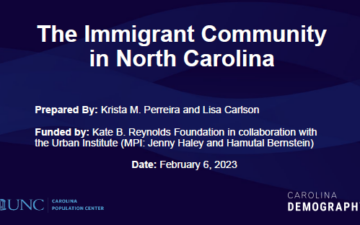How we work
We help you evaluate population data, engage and make decisions
You contact us and tell us what questions you’re trying to answer about your community. In this stage, we’ll also discuss your timeline, budget, audience, and the best way to package information for your use.
We work with you to determine the scope of work, which can include any or all of the services we offer: everything from basic data acquisition to a fully custom presentation or online interactive.
During this stage, we also finalize the cost and schedule of the work. We assign members of our team to work with you and determine whether we need to bring in additional experts or resources from the Carolina Population Center or larger UNC community.
We identify the best data sources and analytical and communications methods to answer your questions. A detailed project plan and work assignments are also completed during this phase.
We do the agreed upon work. We stay in frequent communication to ensure that we’re meeting your requirements, doing so on your timeline and within your budget. Especially, in larger projects, we provide preliminary materials for you to review.
This might be where we deliver a presentation for you, provide a database and documentation, or provide final materials.
We follow up to make sure that you’re satisfied.
We know where to find relevant data and can translate complex information based on the questions you need to answer. We can also help you determine what questions you should be asking.
Using Stata, SAS and R, we can project populations or school enrollments that give insight into how your community will shift in the coming years.
We can identify potential policy responses to demographic change and analyze the impact of current or proposed policies on specific populations.
We convene and engage your stakeholders and decision-makers to facilitate understanding and dialogue and strengthen the capacity of your organization to communicate data-driven ideas.

The Center for Women’s Health Research (CWHR) at the University of North Carolina School of Medicine released the 12th edition of our North Carolina Women’s Health Report Card on May 9, 2022. This document is a progress report on the…

Dr. Krista Perreira is a health economist who studies disparities in health, education, and economic well-being. In collaboration with the Urban Institute, she recently co-led a study funded by the Kate B. Reynolds Foundation to study barriers to access to…

Our material helped the NC Local News Lab Fund better understand and then prioritize their funding to better serve existing and future grant recipients in North Carolina. The North Carolina Local News Lab Fund was established in 2017 to strengthen…
Your support is critical to our mission of measuring, understanding, and predicting population change and its impact. Donate to Carolina Demography today.